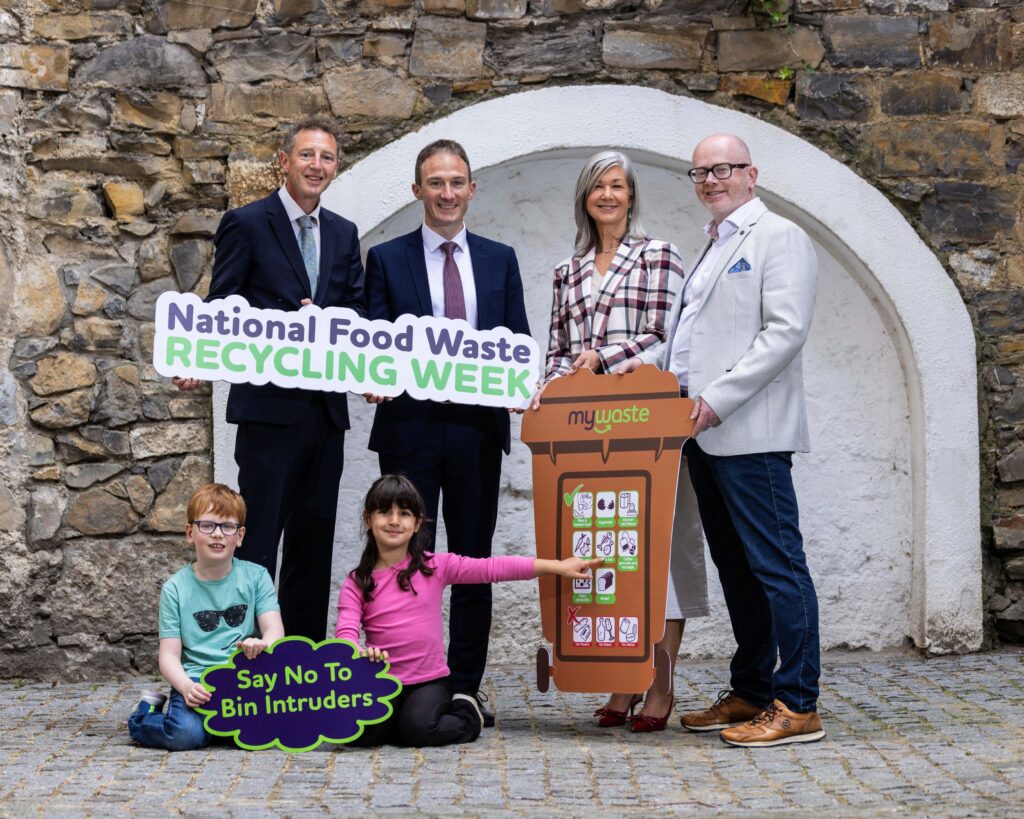
- New campaign launched for National Food Waste Recycling Week celebrates progress in brown bin roll out, urging citizens to become ‘Brown Bin Champions’
- However, confusion (26%) and haste (38%) are leading to some contamination issues
- MyWaste urges citizens to “Say No to Brown Bin Intruders”
As Ireland celebrates its fourth National Food Waste Recycling Week, new research highlights both the remarkable progress made in brown bin usage and the ongoing challenge of contamination. With over 200,000 new brown bins rolled out nationwide since the start of 2024, bringing the total number of brown bin owners across Ireland to approximately 1.2 million, householders in Ireland are embracing food waste recycling like never before. However, a recent study of over 1,000 adults reveals that despite widespread brown bin usage, contamination remains a concern, potentially compromising the quality of compost and hindering our efforts towards a circular economy.
The research, conducted by Empathy Research on behalf of MyWaste, Ireland’s official guide to managing your waste, found that while the vast majority of people use their brown bin (84%), confusion and occasional haste can at times lead to incorrect items being disposed of in the brown bin.
The study indicated that 33% admit to knowingly putting incorrect items in their brown bin, a figure that rises to 50% amongst 18–34-year-olds. The research also highlights confusion about garden waste, with younger adults (18-34) mistakenly believing stones and barbeque coals can be composted. Other common items incorrectly placed in brown bins include general waste (32%), the plastic around vegetables (26%), soft plastics (24%), and food cartons (24%). This National Food Waste Recycling Week (June 1st – June 8th, 2025), MyWaste.ie is launching a new campaign to tackle this problem, focusing on both confusion and haste as key contributing factors.
“I’m delighted to see the continued growth in brown bin usage across the country,” said Minister of State at the Department of the Environment, Climate and Communications with responsibility for Circular Economy, Alan Dillon TD. “The expansion of the programme, coupled with the dedication of Irish citizens, is a testament to our commitment to a circular economy and a greener future. By working together to reduce food waste in the first instance and minimise contamination thereafter, we can ensure that our food and garden waste is transformed into valuable compost, enriching our soil, supporting sustainable agriculture and reducing our carbon footprint.”
The research also explored the reasons behind these mistakes. The primary reason cited for knowingly putting an item in their brown bin incorrectly was being in a hurry (38%), with lack of knowledge about what is accepted in the brown bin being the second most common reason (26%).
“It’s fantastic to see so many households embracing the brown bin system,” said Pauline McDonogh, Resource Efficiency Officer at MyWaste. “However, contamination remains a challenge. This National Food Waste Recycling Week we want to empower everyone to become brown bin champions in their homes, at work or at play. We understand that sometimes it can be confusing, which is why we’re providing clear and accessible information to help everyone use their brown bin correctly. Putting the wrong items in the brown bin can compromise the recycling process, reduce the level of compost produced. Let’s all remember: ‘No Metal, No Glass, No Plastic Makes Our Brown Bin Fantastic!’ By keeping contaminants out of our brown bins, we can protect our soil and contribute to a circular economy.”
What can go into the brown bin?
The brown bin service accepts all types of food including raw and cooked meat and fish, plate scrapings, along with fruit and vegetable peelings. Other items that can go into the brown bin include food-soiled paper napkins, paper towels, greasy pizza boxes as well as grass clippings and light garden waste, including hedge clippings, spent compost and dead plants.
What cannot go into the brown bin?
To avoid contamination, remember to remove all packaging from food waste and avoid adding large branches, stones, rubble, plastic plant pots, barbeque coals or other non-compostable materials from your brown bin.
To help combat contamination, MyWaste.ie offers these tips:
- Take a Minute: As the research shows, being in a hurry is a major contributor to contamination. Slow down and double-check what you’re throwing away.
- Say No to Bin Intruders: Be aware of common contaminants like onion netting, flower bands, and plastic-wrapped vegetables. Remove these items before placing food or garden waste in the brown bin.
- When in Doubt, Check it Out: Use the MyWaste.ie website or your Waste Collectors guidelines to confirm what can and cannot go in your brown bin.
- Use Compostable Liners: To make brown bin management even easier, MyWaste.ie recommends using certified compostable liners in your kitchen caddy. These liners break down naturally during the composting process, keeping your bin clean and preventing odours.
For more information on proper usage, please visit MyWaste.ie for a comprehensive A-Z guide, helpful tips, and answers to frequently asked questions.
